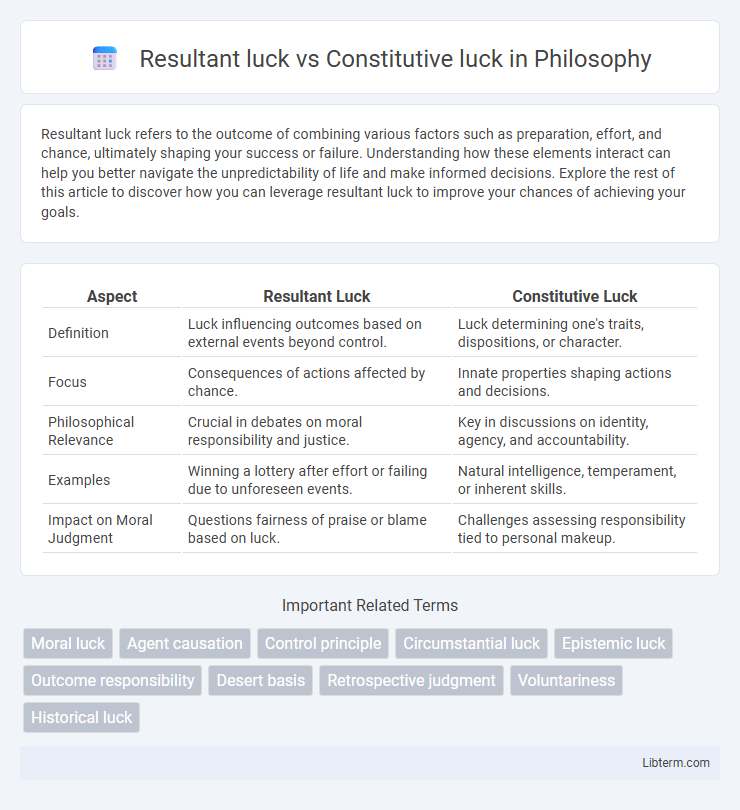Resultant luck refers to the outcome of combining various factors such as preparation, effort, and chance, ultimately shaping your success or failure. Understanding how these elements interact can help you better navigate the unpredictability of life and make informed decisions. Explore the rest of this article to discover how you can leverage resultant luck to improve your chances of achieving your goals.
Table of Comparison
| Aspect | Resultant Luck | Constitutive Luck |
|---|---|---|
| Definition | Luck influencing outcomes based on external events beyond control. | Luck determining one's traits, dispositions, or character. |
| Focus | Consequences of actions affected by chance. | Innate properties shaping actions and decisions. |
| Philosophical Relevance | Crucial in debates on moral responsibility and justice. | Key in discussions on identity, agency, and accountability. |
| Examples | Winning a lottery after effort or failing due to unforeseen events. | Natural intelligence, temperament, or inherent skills. |
| Impact on Moral Judgment | Questions fairness of praise or blame based on luck. | Challenges assessing responsibility tied to personal makeup. |
Understanding Resultant Luck: A Definition
Resultant luck refers to the outcomes influenced by factors beyond an individual's control, emphasizing how unforeseen consequences shape moral and practical evaluations. This concept contrasts with constitutive luck, which concerns the traits and dispositions one inherits or develops independently of their actions. Understanding resultant luck is crucial for assessing responsibility, as it highlights the role of chance events in the success or failure of intentional efforts.
Defining Constitutive Luck in Everyday Life
Constitutive luck refers to the traits, dispositions, and capacities individuals are born with or develop early in life, shaping their identity and behavior. In everyday life, this type of luck influences personal opportunities and challenges, such as innate intelligence, temperament, or health conditions, which are beyond one's control but significantly impact life outcomes. Understanding constitutive luck highlights how much of a person's situation arises from factors not chosen, influencing moral responsibility and self-assessment.
Key Differences Between Resultant and Constitutive Luck
Resultant luck refers to the outcomes influenced by chance events beyond an individual's control, such as accidents or unforeseen consequences, while constitutive luck involves inherent traits or circumstances that shape a person's character and abilities. A key difference lies in their impact timeframe: resultant luck affects external results after actions occur, whereas constitutive luck shapes the internal conditions preceding those actions. Legal and philosophical discussions often emphasize resultant luck in assessing moral responsibility, contrasting it with constitutive luck's role in determining personal dispositions.
Historical Perspectives on Luck in Philosophy
Historical perspectives on luck in philosophy distinguish between resultant luck, which concerns the outcomes of actions beyond an agent's control, and constitutive luck, referring to the inherent traits and circumstances shaping a person's character. Philosophers like Bernard Williams and Thomas Nagel emphasized resultant luck's impact on moral responsibility, while constitutive luck is linked to debates about free will and personal identity. This dual framework highlights how different forms of luck influence ethical evaluation and the philosophy of agency throughout history.
Real-World Examples of Resultant Luck
Resultant luck refers to outcomes influenced by factors beyond control, such as winning a lottery due to a random draw or surviving a car accident purely because of a minor timing difference. In 2011, a commuter narrowly avoided the London riots simply because their train was delayed, showcasing resultant luck's impact on personal safety. These examples highlight how chance events can drastically alter life trajectories despite individuals' decisions and actions.
Common Scenarios Illustrating Constitutive Luck
Constitutive luck refers to aspects of a person's traits, dispositions, or circumstances that shape their character and abilities, which are beyond their control. Common scenarios illustrating constitutive luck include individuals born with innate talents, such as exceptional memory, or those raised in nurturing environments that foster resilience and confidence. These examples highlight how factors like genetics and upbringing fundamentally influence personal development and decision-making capacities.
The Moral Implications of Luck Types
Resultant luck, which concerns outcomes beyond an agent's control, raises questions about moral responsibility when individuals are praised or blamed for consequences they did not intend or foresee. Constitutive luck relates to an individual's character and dispositions shaped by factors outside their control, challenging the fairness of moral judgments based on traits they did not choose. Understanding these distinctions is essential in ethical theory to discern how external factors influence moral accountability and justice.
How Resultant Luck Impacts Personal Responsibility
Resultant luck significantly influences personal responsibility by determining the actual outcomes of actions beyond an individual's control, which can affect moral and legal judgments. For example, two people may take identical risks, but only one experiences harm due to chance, raising questions about fairness in assigning blame or praise. This dependency on chance outcomes challenges the consistency of holding individuals fully accountable for consequences shaped by Resultant luck.
Constitutive Luck and Its Role in Shaping Identity
Constitutive luck refers to the aspects of an individual's identity shaped by factors beyond their control, such as genetics, upbringing, and socio-cultural background, which fundamentally influence personality traits, values, and capacities. This form of luck plays a critical role in moral philosophy and psychology by challenging notions of personal responsibility and accountability, as many core aspects of selfhood stem from circumstances one did not choose. The interplay of constitutive luck with social environment and life experiences highlights the complex formation of identity, emphasizing that much of who we are is contingent rather than wholly self-determined.
Navigating Life: Balancing Resultant and Constitutive Luck
Navigating life effectively requires understanding the interplay between resultant luck--outcomes shaped by chance events--and constitutive luck, the inherent traits and circumstances individuals are born into. By acknowledging constitutive luck, people can recognize the foundational factors influencing their opportunities, while managing resultant luck through decision-making and risk assessment helps mitigate unpredictable effects on life paths. Balancing these aspects fosters resilience and adaptability in pursuing goals amidst uncertainty.
Resultant luck Infographic

 libterm.com
libterm.com